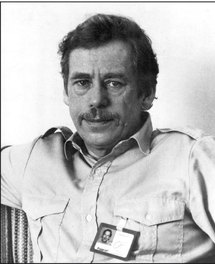
A freedom icon who played a key role in then Czechoslovakia's 1989 anti-communist Velvet Revolution, the 74-year-old Havel was unable to attend the Monday press screening as he was recovering from acute bronchitis in a Prague hospital where he was admitted last Tuesday.
The film's producer Jaroslav Boucek told journalists Havel hoped to attend the official premiere on March 22 before "Leaving" hits cinemas across the Czech Republic two days later.
The plot is based on a play written by Havel after he ended his 14 years as president in 2003.
It tells the story of Vilem Rieger, a chancellor who, as he prepares to leave power, sees his world collapse amid treachery and a merciless confrontation with his unscrupulous successor, Vlastik Klein.
Havel admits to having been inspired by Shakespeare's "King Lear" and Anton Chekhov's "The Cherry Orchard" for the play, which was first staged in 2008.
At the theatrical premiere of "Leaving", Havel said he had also been inspired by the fate of certain communist "apparatchiks" who had been deprived of their posts.
The author of other plays which blended the Theatre of the Absurd with a Kafkaesque flavour, his works include "Largo Desolato", "The Garden Party" or "Conspirators", Havel was born into a wealthy Prague family which owned the city's famous Barrandov studios before they were expropriated by the communists.
Despite his family roots being in cinema, Havel admits his debut in film wasn't easy.
"My theatre pieces are largely based on dialogue, which makes it a little difficult to bring them to the screen. I had to cut certain dialogues and other passages," he said in a Monday statement.
His wife, actress Dagmar Havlova-Veskrnova, has a starring role in the film, playing the retiring chancellor's companion.
Vilem Rieger is a "hero who shows us a model destiny. In effect, each one of us can from one day to the next face such a quick change and it is up to you to adjust to it," says Czech actor Josef Abrham who plays Rieger.
The film has once again sparked debate about the long-time political rivalry between Havel and his conservative successor as Czech president, Vaclav Klaus.
Some viewers swear they recognise certain character traits of Vlastik Klein as resembling the personality of the current Czech head of state, a suggestion which Havel has flatly denied.
"Vaclav Klaus? No, no, not a single word was said on this topic during the entire shoot. Vaclav Havel explained the character in a completely different manner," insists actor Jaroslav Dusek, featured as the conniving Klein.
Early reviews however, suggest the film will not meet with unanimous critical acclaim.
"President Havel is a personality, citizen Havel is a personality, playwright Havel is a personality but film director Havel is just a beginner. But a promising one," the eminent Czech critic Mirka Spacilova with the Dnes daily wrote of the film.
------------------------------------------------------------------------------
The film's producer Jaroslav Boucek told journalists Havel hoped to attend the official premiere on March 22 before "Leaving" hits cinemas across the Czech Republic two days later.
The plot is based on a play written by Havel after he ended his 14 years as president in 2003.
It tells the story of Vilem Rieger, a chancellor who, as he prepares to leave power, sees his world collapse amid treachery and a merciless confrontation with his unscrupulous successor, Vlastik Klein.
Havel admits to having been inspired by Shakespeare's "King Lear" and Anton Chekhov's "The Cherry Orchard" for the play, which was first staged in 2008.
At the theatrical premiere of "Leaving", Havel said he had also been inspired by the fate of certain communist "apparatchiks" who had been deprived of their posts.
The author of other plays which blended the Theatre of the Absurd with a Kafkaesque flavour, his works include "Largo Desolato", "The Garden Party" or "Conspirators", Havel was born into a wealthy Prague family which owned the city's famous Barrandov studios before they were expropriated by the communists.
Despite his family roots being in cinema, Havel admits his debut in film wasn't easy.
"My theatre pieces are largely based on dialogue, which makes it a little difficult to bring them to the screen. I had to cut certain dialogues and other passages," he said in a Monday statement.
His wife, actress Dagmar Havlova-Veskrnova, has a starring role in the film, playing the retiring chancellor's companion.
Vilem Rieger is a "hero who shows us a model destiny. In effect, each one of us can from one day to the next face such a quick change and it is up to you to adjust to it," says Czech actor Josef Abrham who plays Rieger.
The film has once again sparked debate about the long-time political rivalry between Havel and his conservative successor as Czech president, Vaclav Klaus.
Some viewers swear they recognise certain character traits of Vlastik Klein as resembling the personality of the current Czech head of state, a suggestion which Havel has flatly denied.
"Vaclav Klaus? No, no, not a single word was said on this topic during the entire shoot. Vaclav Havel explained the character in a completely different manner," insists actor Jaroslav Dusek, featured as the conniving Klein.
Early reviews however, suggest the film will not meet with unanimous critical acclaim.
"President Havel is a personality, citizen Havel is a personality, playwright Havel is a personality but film director Havel is just a beginner. But a promising one," the eminent Czech critic Mirka Spacilova with the Dnes daily wrote of the film.
------------------------------------------------------------------------------









 Home
Home Politics
Politics









